Table of Contents
- Caffeine: More Than Just Waking Up
- Caffeine Kings: Arabica vs. Robusta Smackdown
- Roast Level Rumble: Light vs. Dark Caffeine?
- How You Brew Matters for Coffee Caffeine
- Brand Buzz: The Caffeine Kings of Coffee
- Caffeine Overload? Knowing Your Limits
- More Than Just the Bean: Caffeine Wild Cards
Caffeine: More Than Just Waking Up
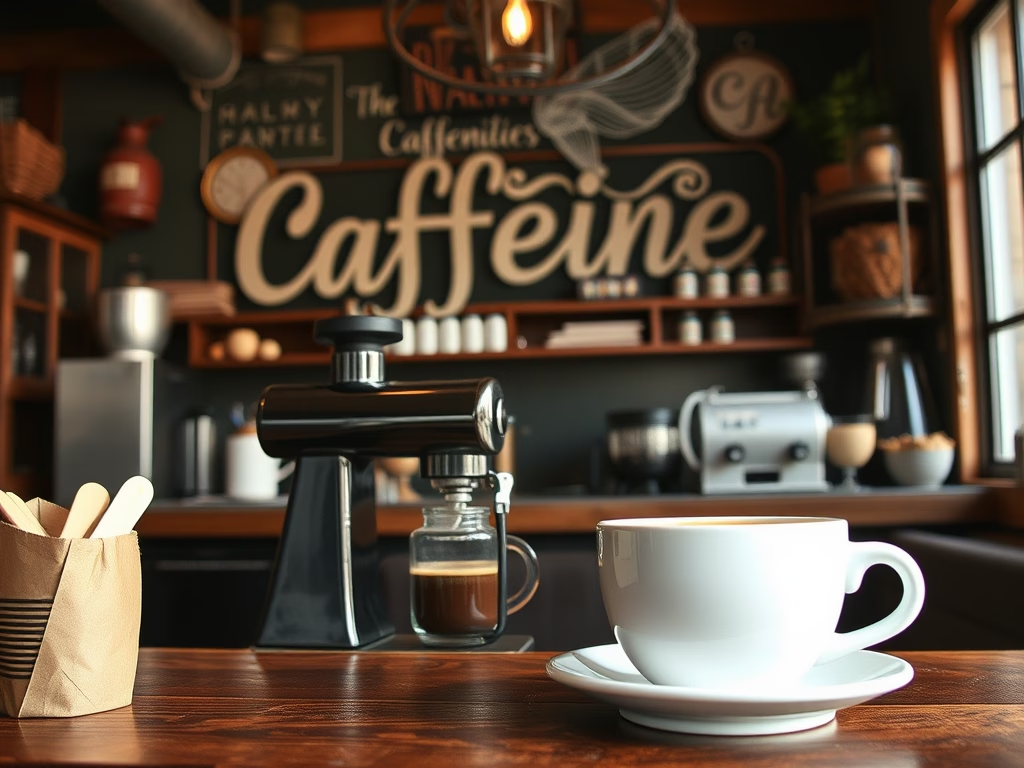
Okay, so we all know coffee wakes you up. Duh. But caffeine? It’s way more than just that morning jolt. Like, last week I was cramming for that history test – yeah, the one about the War of 1812 – and I swear, that extra cup of joe helped me remember the difference between the British and the Americans. Maybe. It’s supposed to help your short-term memory, according to CoffeeAbout. Which is cool, I guess.
Caffeine Perks: Way More Than Just Jitters
Seriously, caffeine might even help you lose weight! I’m not saying ditch the gym for a latte, but some studies suggest it can give your metabolism a little boost. I mean, I’m skeptical – especially after that entire bag of Doritos I polished off last night – but hey, I’m willing to try anything once, right? I read on TheProperKitchen that caffeine impacts short-term memory and potential weight loss aids, so I guess that’s cool.
Your Daily Dose: Not a One-Size-Fits-All Deal
So, like, how much is too much? Well, the grown-up people at CoffeeAbout say 400mg is usually okay for adults. But hold up! That’s a NO-GO for younger kids, teens, or anyone who’s pregnant or breastfeeding. They should stick to around 200mg. My little cousin snuck a sip of my mocha last Thanksgiving and was bouncing off the walls for, like, three hours. It was not fun for anyone.
And here’s something kinda weird: that super “strong” coffee your barista brags about? It doesn’t always mean more caffeine. FluentInCoffee says it could just be over-extracted, which basically means it’s bitter and gross. Like that time I tried to make cold brew and it tasted like dirt. Ugh.
I’m not 100% sure, but I think the time of year matters, too. Like, during the summer, I am all about the iced coffee, but I don’t want to be all jittery when I’m trying to chill on the beach. Speaking of the beach, I gotta get a new umbrella. My old one broke last summer. Anyway, where was I? Oh yeah, caffeine. So, understanding caffeine levels helps you tailor your coffee consumption. Makes sense, right?
This is important, so I am going to say it again: it is important to know your caffeine limits. If you do not, you might regret it.
Caffeine Kings: Arabica vs. Robusta Smackdown
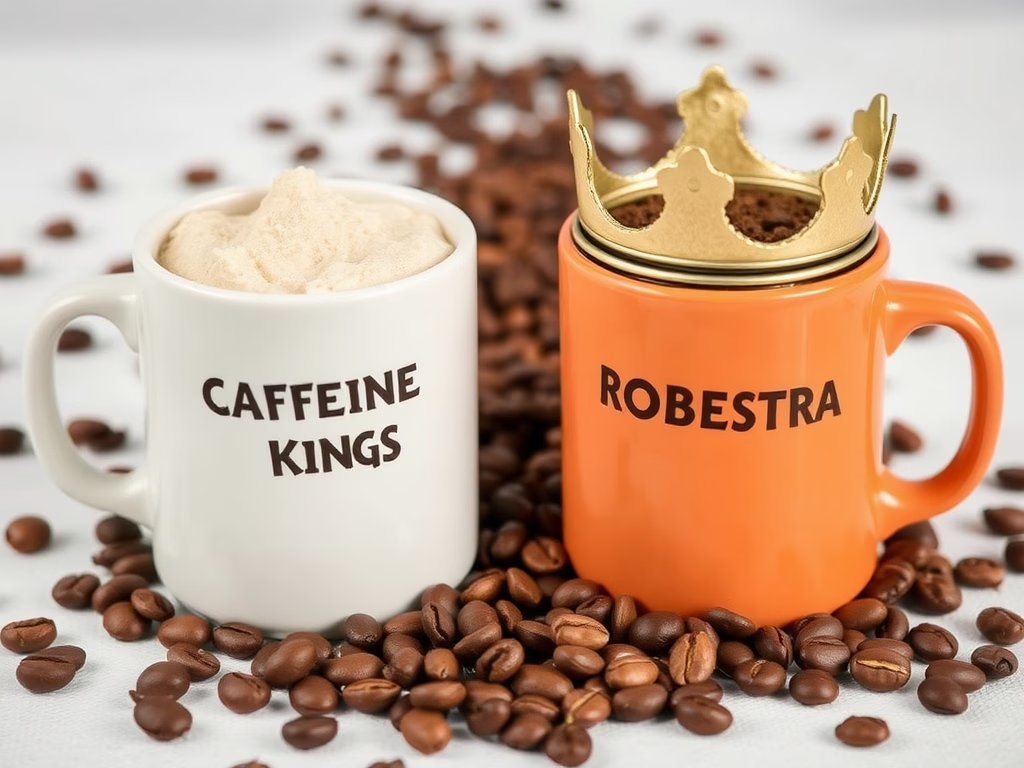
Let’s explore Caffeine Kings: Arabica vs. Robusta Smackdown in more detail. This is an important aspect of which coffee beans has the most caffeine that deserves attention.
Robusta’s Reign: Double the Buzz, Hold the Finesse?
Okay, so you want the real deal, the bean that’ll launch you into orbit? Let’s talk Robusta. These bad boys aren’t playing around. We’re talking something like 2.2% to 2.7% caffeine per bean. Yeah, you read that right – potentially double what you get from those fancy-pants Arabica beans. I mean, seriously, it’s the difference between a gentle nudge and a full-on rocket launch. I remember last summer, I was pulling an all-nighter trying to finish this project, and I made the mistake of using some Robusta my buddy gave me. Let’s just say I was alphabetizing my spice rack at 4 AM. No regrets. Well, maybe a few.
Thing is, Robusta gets a bad rap sometimes. People say it’s too bitter, too…intense. And, yeah, it’s definitely bolder. Some even say it tastes kinda rubbery. I don’t know about all that. I think it’s got character. Plus, all those high-caffeine coffee brands? Betcha a dollar they’re sneaking some Robusta in there to give you that extra jolt. Don’t tell anyone I told you that. So, if you’re all about that mega-caffeine life, Robusta might just be your new best friend. Just be prepared for a flavor that punches you in the face. In a good way? Maybe.
Arabica’s Allure: Flavor First, Caffeine…Eventually
Now, for the coffee snobs—I mean, aficionados—out there, there’s Arabica. These beans are all about the flavor. Think smooth, complex, maybe even a little fruity. But here’s the kicker: they’re not exactly caffeine powerhouses. We’re talking more like 1.2% to 1.5% caffeine. Still gets the job done, but it’s more of a gentle encouragement than a full-blown intervention. I’m honestly not sure why people choose flavor over caffeine. I guess it’s a preference thing?
Honestly, I’m more of an Arabica kinda guy on the regular. Last week I tried this Ethiopian Yirgacheffe – wow! So delicate, so floral. I dropped my Roomba on Tuesday and all the coffee grounds went everywhere, tragic. Anyway, where was I? Oh yeah, Arabica! It’s just…more enjoyable to drink. Sure, it won’t keep you up all night binge-watching that new Netflix show, but it will make your mornings a little brighter. And isn’t that what life’s all about? Little moments of joy? I’m getting all philosophical now. Sorry. But yeah, Arabica. Good stuff.
Beyond the Big Two: Other Beans in the Caffeine Game
Hold up, did you think it was just Arabica and Robusta? Nah, there’s a whole wide world of coffee beans out there, and some of them are pretty darn interesting. Let’s talk Liberica and Excelsa, shall we? I actually just learned about these recently myself. It’s like discovering a whole new level in a video game. Mind. Blown.
Liberica: Smokey, Woody, and…Not That Caffeinated
So, Liberica beans are known for their smokey, woody flavor. Some people describe it as floral or even fruity, but I’m sticking with smokey and woody. They’re kinda the weird uncle of the coffee bean family. And caffeine-wise? They’re hanging out around 1.2%, which puts them in the same ballpark as Arabica. So, if you’re looking for a caffeine kick, Liberica isn’t your best bet. But if you’re after a unique flavor experience, give ’em a try. I haven’t yet, but I’m kinda curious. Maybe I’ll order some online tonight. I’ll let you know how it goes!
Excelsa: Sour, Tart, and a Little Bit Less Caffeinated
Then there’s Excelsa. These beans are closely related to Arabica, but they have this unique sour and tart flavor that’s…well, it’s different. I’ve heard people say it adds complexity to blends, but honestly, I’m not sure if I’d like it on its own. And the caffeine content? Around 1.1%. So, even less than Arabica. But hey, maybe that’s a good thing! Maybe you just want a little pick-me-up without the jitters. Maybe you want to pair it with your decaf coffee. Whatever floats your boat. I’m not judging. Well, maybe a little.
Roast Level Rumble: Light vs. Dark Caffeine?
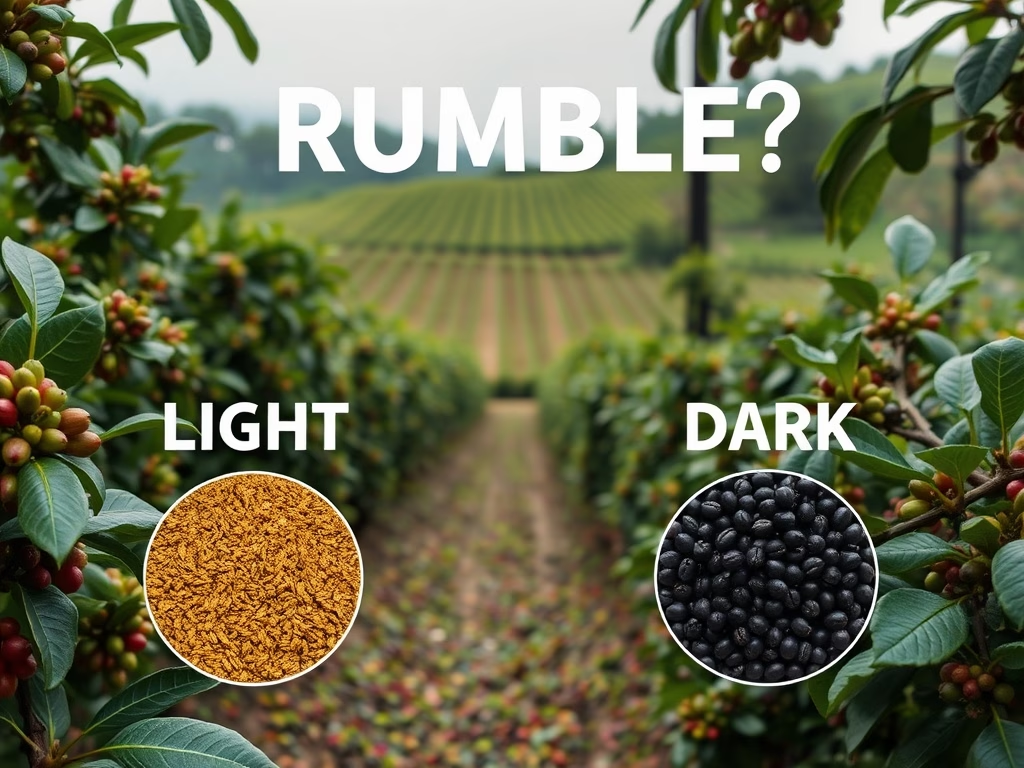
The caffeine difference between light and dark roast coffee is negligible when measured by bean. If you use a scoop, light roasts may offer more caffeine due to their higher density, while weighing your coffee might give dark roasts a slight edge due to bean mass. Experiment to find what works best for your preferred brewing method.
Let’s explore Roast Level Rumble: Light vs. Dark Caffeine? in more detail. This is an important aspect of which coffee beans has the most caffeine that deserves attention.
Dark Roast Deception: The Truth About Caffeine
So, you’re probably wondering if dark roast coffee is like, some super-caffeinated monster, right? I used to think so too! But guess what? It’s mostly a myth. The roasting process itself doesn’t really kill off a crazy amount of caffeine. I mean, some *does* get lost, but we’re talking tiny amounts. Like, imagine finding a penny on the street – that’s how much caffeine disappears. Basically, bean for bean, light and dark roasts are surprisingly similar in caffeine content. Who knew?
I remember last fall, I was trying to pull an all-nighter to finish my spooky Halloween costume (I was going as a caffeinated zombie, naturally). I brewed a pot of super dark French roast, thinking I’d be buzzing for days. Turns out, I just got a slightly bitter taste and a mild case of the jitters. My costume was still a mess. I shoulda started it sooner…
Scoops vs. Weight: Does It Even Matter?
Okay, here’s where things get a little funky. How you measure your coffee actually makes a difference! If you’re a scooper – like me, because who has time to weigh beans at 6 AM? – then light roast is gonna give you a bigger caffeine kick. Why? Because light roast beans are denser. That means more caffeine-packed beans fit into that scoop. But, if you’re all about that precise weight life with a scale, dark roast might have a slight edge because you’re getting more bean mass overall. Confusing, I know!
Honestly, I’m not 100% sure which method is truly “better.” I think it depends on how you usually make your coffee. Like, my grandma, she just eyeballs it. She’s been doing that for like, 70 years! I tried to explain the density thing to her last Thanksgiving and she just looked at me like I was nuts. “Just make the coffee, dear,” she said. And you know what? She’s probably right.
So, what’s the takeaway? Don’t stress too much about the roast level when you’re chasing that caffeine buzz. It’s not as big of a deal as you might think. Instead, experiment! Try different beans, different brewing methods…see what works for *you*. And maybe, just maybe, start your Halloween costume a little earlier next year. You know, for the sake of my sanity!
How You Brew Matters for Coffee Caffeine
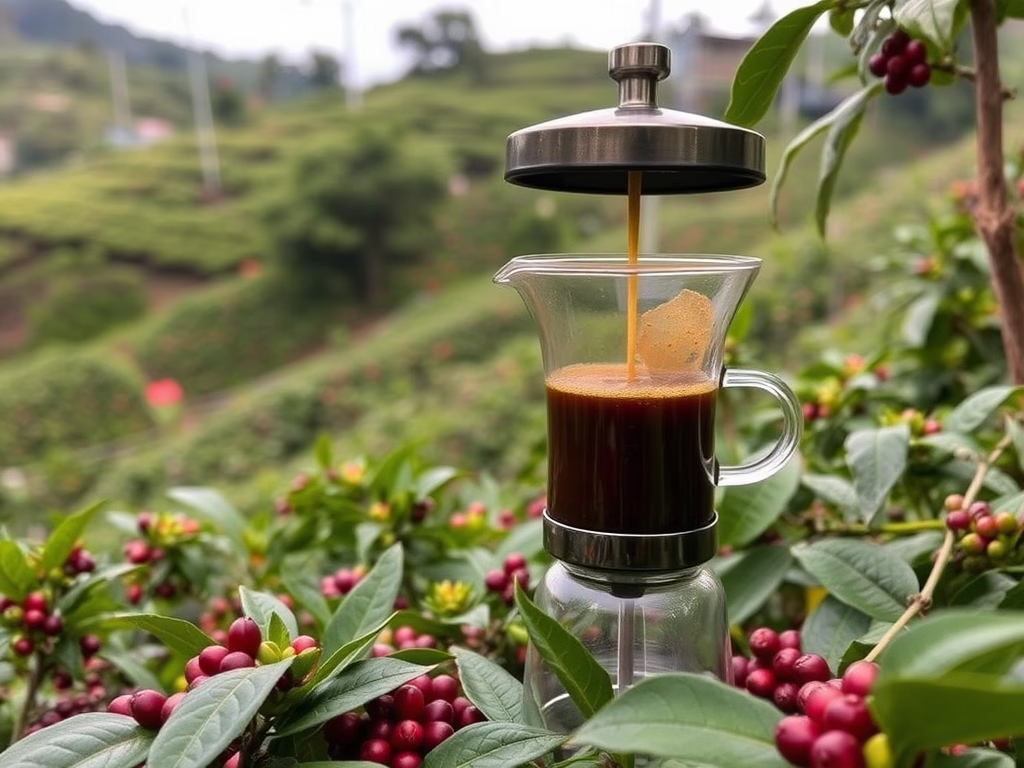
Let’s explore How You Brew Matters for Coffee Caffeine in more detail. This is an important aspect of which coffee beans has the most caffeine that deserves attention.
French Press Power: Immersion for Maximum Caffeine
Alright, let’s talk French press. I gotta admit, I love mine. It’s all about that full immersion, right? Basically, you’re letting the coffee grounds just hang out in hot water for a while. Like, a good four minutes, at least. This longer steeping time? Yeah, that’s what pulls out more caffeine. TheProperKitchen says you can get like, 100 to 150 mg of caffeine in an 8-ounce cup. Not bad, not bad at all. EspressoInsiders even claims upwards of 150mg per 6oz serving. I believe it! Last week I made a cup and honestly felt like I could run a marathon…or at least clean my apartment, which is saying something.
Espresso’s Edge: Concentration in a Small Package
Espresso. Don’t let the tiny size fool ya. It’s like, super concentrated. FluentInCoffee says it’s got around 64mg of caffeine per ounce. Which is WAY higher than your standard drip coffee. CoffeeAbout puts it at 60-72mg. I mean, think about it. You’re forcing hot water through finely-ground beans under pressure. It’s gotta pack a punch! I honestly think those fancy espresso machines are a little over-hyped, though. Like, do you *really* need a $2000 machine to make a decent shot? Probably not. I bet you can get pretty close with a moka pot, which is way cheaper. Just my two cents.
Cold Brew’s Caffeine Kick: Extended Steeping, Potent Results
Cold brew is the patient one in the family. You’re letting those grounds soak in cold water for like, 12-24 hours. Seriously! That long, slow process extracts a ton of caffeine. TheProperKitchen says you can end up with 100 to 200 mg of caffeine per cup. CoffeeAbout is even higher, saying a 16oz serving can hit 197-213 mg! Whoa. I made a batch last summer – July 14th to be exact, I remember because I almost forgot about it completely – and it definitely kept me going through that heat wave. Fair warning, though: too much cold brew and you might start seeing sounds. Or is that just me? Anyway… point is, brewing method matters a LOT when you’re chasing that caffeine dragon. So, give these a try. See which one gives you the biggest boost. You might be surprised!
Brand Buzz: The Caffeine Kings of Coffee
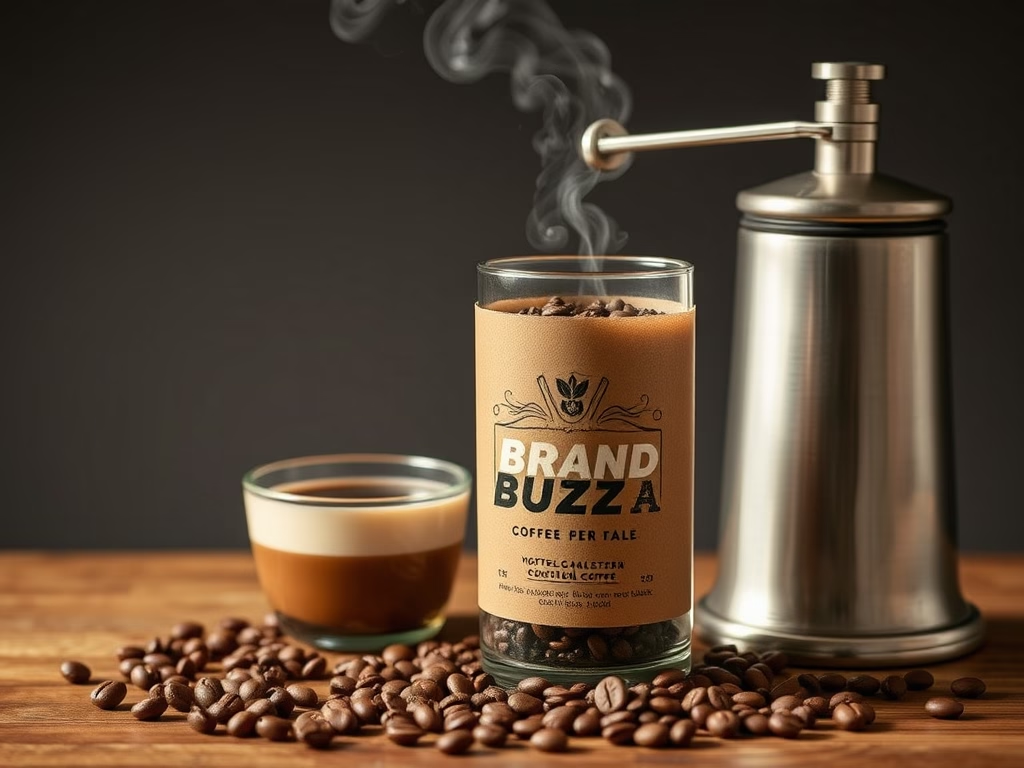
Let’s explore Brand Buzz: The Caffeine Kings of Coffee in more detail. This is an important aspect of which coffee beans has the most caffeine that deserves attention.
Death Wish Coffee: A Blend for a Bold Jolt
Alright, let’s talk about Death Wish Coffee. These guys are, like, super famous for being strong. Seriously, you’ve probably seen their skull logo somewhere. I think my brother-in-law even has a Death Wish Coffee t-shirt… Anyway, they use a mix of Arabica and Robusta beans, and they brag about having around 728 mg of caffeine in a 12-ounce cup. That’s a LOT. According to TheProperKitchen.com, at least. And FluentInCoffee says it’s about 59mg per ounce. I tried it once before a road trip to see my mom in Jacksonville, Florida. Let’s just say I didn’t need any rest stops. Maybe *too* much energy, though? Like, I reorganized her entire garage. She wasn’t thrilled.
Black Insomnia: Robust Flavor, Intense Caffeine
Next up, Black Insomnia Coffee. I’m not 100% sure, but I think I saw them on Shark Tank once? Maybe? Anyway, they claim to have around 702 mg of caffeine per 12 ounces, and they also use Arabica and Robusta beans. Black Insomnia really pushes the “strongest coffee” thing, and you know what? They might be right! I gotta say, I’m a little skeptical of all these “world’s strongest” claims, though. It’s like when every pizza place in New York claims to have the best pizza… you know somebody’s lying. Still, it’s a pretty solid cup of joe. Not bad, not bad at all.
Biohazard Coffee: The Caffeine Crown?
Okay, now we’re talking. Biohazard Coffee… These guys are intense. Word on the street is they might have the MOST caffeine out of all of ’em. Like, a whopping 928 mg in a 12-ounce serving, according to HomeGrounds! That’s insane! They use an Arabica/Robusta blend too, which seems to be the secret sauce for crazy caffeine levels. Honestly? I’m a little scared to try it. I accidentally dropped my Roomba on Tuesday, and I’m pretty sure it’s plotting its revenge. I don’t need any extra jitters in my life right now, ya know? But if you’re looking for a serious kick in the pants… this might be it. Then again, I’m not a doctor. Or a coffee expert, really. Just a regular dude who likes coffee… a lot.
So, there you have it! A few of the big names in the high-caffeine coffee game. I’m not saying you *need* this much caffeine to function, but… hey, sometimes you just do, right? Just remember to drink responsibly, and maybe don’t reorganize your mother-in-law’s garage after drinking a pot of it. Trust me on that one.
Caffeine Overload? Knowing Your Limits
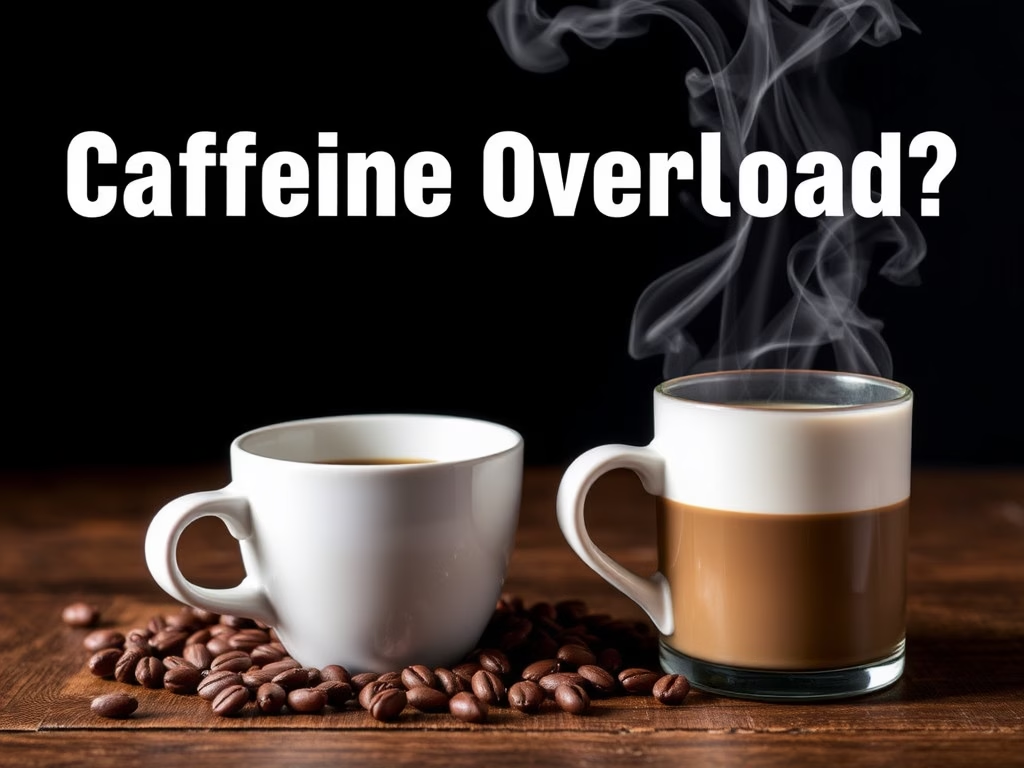
Let’s explore Caffeine Overload? Knowing Your Limits in more detail. This is an important aspect of which coffee beans has the most caffeine that deserves attention.
How Much is Too Much? Your Caffeine Tolerance
So, we’ve been yapping about which coffee beans have the most kick, but hold up! Not everyone can handle that rocket fuel. Last week, I tried some super-strong stuff from a local roaster – “Death Wish Decaf,” I think it was called? Kidding, obviously! It was actually called “Midnight Sun.” Anyway, my heart was pounding like I’d just run a marathon, and I was jittery all day. Not a good look when you’re trying to, you know, *adult*.
Turns out, caffeine sensitivity is a real thing. Some folks can chug espresso all day and be totally chill. Others – like maybe me – get all wired and anxious. TheProperKitchen says it’s different for everyone, and they’re spot on. Listen to your body, people! It’s way smarter than your brain when it comes to this stuff. And if you start feeling like you’re vibrating, maybe cut back a little, yeah?
Finding the Sweet Spot: Good and Bad Caffeine Effects
Okay, so caffeine isn’t all bad. I mean, it gets me going in the morning – usually. And CoffeeAbout mentions that caffeine, in moderation, can actually be good for your brain and even your metabolism. Who knew? But, and this is a big BUT, too much can mess you up. Insomnia? Check. Digestive issues? Double-check! I swear, one time I drank so much coffee I thought I was gonna… well, let’s just say it wasn’t pretty. And addiction is real, too. Don’t become a caffeine zombie, okay?
I’m not 100% sure on the exact science, but I think it’s like, a bell curve thing. A little caffeine is great, a ton is terrible. Finding that sweet spot is key. I’m still working on it, TBH. Especially now that it’s almost Thanksgiving and my family is coming. Might need industrial-strength coffee for that!
Seriously, though, be smart about this stuff. Pay attention to how you feel, and don’t be afraid to experiment – within reason, of course. Maybe start with a lighter roast and work your way up. Or, you know, just stick to decaf. No shame in that game. Although, I do have to say, if you’re gonna go decaf, why bother?
More Than Just the Bean: Caffeine Wild Cards
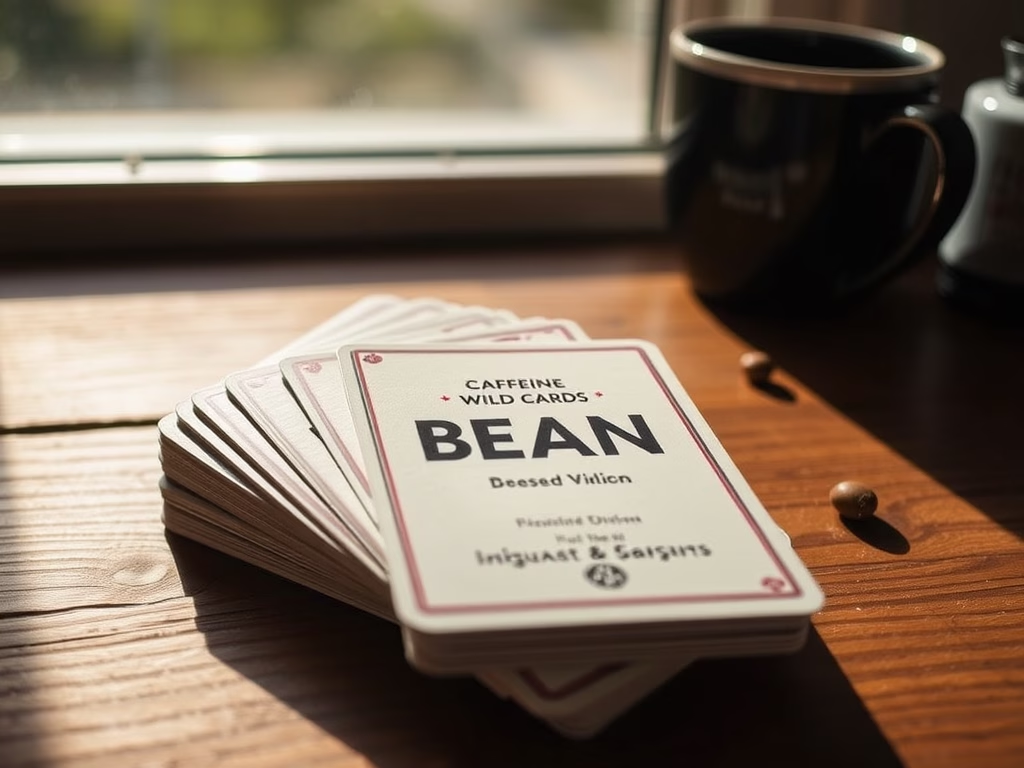
Let’s explore More Than Just the Bean: Caffeine Wild Cards in more detail. This is an important aspect of which coffee beans has the most caffeine that deserves attention.
Grind Size: Does it Really Change Things?
Okay, so we’ve been talking beans, beans, beans, but it’s not JUST about the bean, ya know? Like, what if you grind it super fine versus chunky style? Does it even matter? Well, kinda. I mean, according to CoffeeAbout, finer grinds *can* pull out a smidge more caffeine. We’re talking a tiny difference, though. Think of it like this: the finer the grind, the more surface area the water hits, right? More surface, more extraction. More extraction, more caffeine! FluentInCoffee backs this up too. I tried experimenting last week with a super-fine espresso grind versus a coarser French press grind using the same bean… Honestly? I barely noticed a difference in buzz. Maybe I need a more sensitive caffeine-o-meter, haha!
Hot Water = More Buzz? Probably.
Water temperature is another sneaky factor. Hotter water = more extraction. Makes sense, right? FluentInCoffee says it plain as day. More extraction = more caffeine. TheProperKitchen also chimes in that longer brewing times usually mean more caffeine gets pulled out. I burned my tongue on some diner coffee last Tuesday (don’t ask how I dropped my Roomba that day, too!), and I swear that stuff had me bouncing off the walls for HOURS. Maybe it was the super-hot water? Or maybe it was just a Tuesday.
Decaf: The Great Lie?
Let’s talk decaf. That stuff is NOT caffeine-free, people! I know, shocking, right? CoffeeAbout says you’re still looking at around 0.25-0.37 mg of caffeine per ounce. EspressoInsiders puts the bean caffeine anywhere from 2 to 8 mg. I mean, seriously, what’s the point? Okay, okay, I get it. Some people are super sensitive or just want the taste without the jitters. But still… it’s a bit of a deception, isn’t it? It’s like diet soda – you think you’re being healthy, but then BAM! Artificial sweeteners. I’m not 100% sure, but I think the whole decaf coffee thing is a marketing ploy. Don’t @ me!
So, yeah, picking the right bean is key for maximum caffeine, but don’t forget about the grind, the water temp, and the fact that decaf is basically a lie. Now, go forth and experiment! Just don’t blame me if you’re up all night cleaning your house at 3 AM – or dropping your Roomba!

